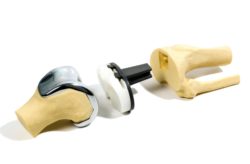Top Class Actions’s website and social media posts use affiliate links. If you make a purchase using such links, we may receive a commission, but it will not result in any additional charges to you. Please review our Affiliate Link Disclosure for more information.

These patients experience complications such as swelling and decreased range of motion as the implant comes loose. This loosening is known as “aseptic loosening” because it is not due to a bacterial infection.
In addition, there are often symptoms of “bone cement implantation syndrome,” a type of toxicity caused by the chemicals used in the bone cement. Exposure to these toxins can lead to hypoxia, hypotension, blood clotting and cardiac failure; in some cases, the results can be fatal.
In virtually all cases, patients whose knee prostheses come loose due to defective bone cement must undergo revision surgery within three years of the initial operation.
Knee Replacement Surgery and Bone Cement Failures
Surgeons employ one of two techniques when replacing a knee joint. One involves the use of screws and/or bolts to fix the prosthesis in place while bone grows around it, fixing it in place. The other, less expensive method uses a specially formulated cement, which comes with its own set of risks.
There are three types of cement, which are classified according to their viscosity, or thickness. Generally, surgeons prefer high-viscosity cement (HVC) because it can be mixed more quickly, is easier to control and sets up faster. However, research indicates that HVC does not hold its bond as well as the thinner formulas, causing problems for patients.
One such product, CMW 1 with Gentamicin by DePuy Synthes, has been the subject of adverse event reports submitted to the FDA since at least 2012. An early report, submitted through the agency’s MAUDE system, indicated that gentamicin, an antibiotic mixed into bone cement in order to prevent infections, was associated with kidney disorders and hearing loss.
Why Does High-Viscosity Bone Cement Fail to Hold Its Bond?
The reason for bone cement failures is not precisely known (other than that the problem appears to primarily affect HVC). However, evidence presented in a lawsuit filed in 2015 suggested that the problem may lie in the size of the particles used in the powder component.
The newer formula for high-viscosity bone cement contains particles that are twice the size of those used in lower viscosity products. It is believed that these “non-micronized” particles may compromise the product’s adhesive properties, causing it to fail.
DePuy’s first bone cement was approved by the FDA in 1997 through a process known as “510(k) Premarket Approval.” This loophole in the law allows medical device and health care product manufacturers to bypass the normally rigorous clinical studies and research (as well as application fees) by demonstrating that a new product is virtually identical to a predicate device that is already on the market.
While this law had good intentions (its original purpose was to get new, potentially life-saving medical products to patients who need them in the shortest amount of time), it has had the unfortunate effect of allowing many dangerous products on to the market. Lawsuits abound on fast tracked medical devices from metal hip implants to vaginal mesh. HVC bone cement may be the latest addition to these products.
Current lawsuit investigations are looking into whether or not manufacturers were aware of potential problems with high viscosity bone cement failure before these products were brought to market. Knee replacement recipients who suffered from bone cement complications may be eligible to participate.
If you or a loved one underwent revision knee replacement surgery or your doctor is recommending revision surgery three years or less after the initial implant and a bone cement was used, you may qualify to file a knee replacement revision surgery lawsuit. See if you qualify by filling out the free form on this page.
ATTORNEY ADVERTISING
Top Class Actions is a Proud Member of the American Bar Association
LEGAL INFORMATION IS NOT LEGAL ADVICE
Top Class Actions Legal Statement
©2008 – 2024 Top Class Actions® LLC
Various Trademarks held by their respective owners
This website is not intended for viewing or usage by European Union citizens.
Get Help – It’s Free
Join a Free Knee Replacement Cement Failure Lawsuit Investigation
If you qualify, an attorney will contact you to discuss the details of your potential case at no charge to you.
PLEASE NOTE: If you want to participate in this investigation, it is imperative that you reply to the law firm if they call or email you. Failing to do so may result in you not getting signed up as a client or getting you dropped as a client.
Oops! We could not locate your form.












